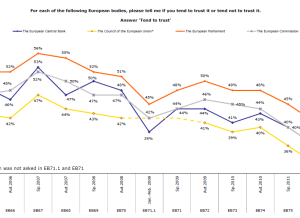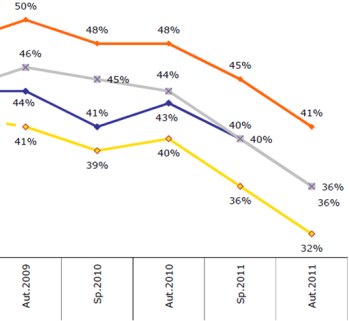Note: re-post from the sister-blog
The Commission has recently published its vision about the future of European integration. The report is more than ambitious calling for full banking, economic, budgetary and political integration, including ‘dedicated fiscal capacity for the euro area’ which I believe means taxation powers for the EU. Here is the assessment of the Commission about the present state of EU’s legitimacy:
The Lisbon Treaty has perfected the EU’s unique model of supranational democracy, and in principle set an appropriate level of democratic legitimacy in regard of today’s EU competences. ..it would be inaccurate to suggest that insurmountable accountability problems exist. (p.35)
Wow, wait a minute! P e r f e c t e d the model of supranational democracy?! Appropriate level of democratic legitimacy?! Are the Commissioners living on the same planet as the rest of us? According to data from autumn 2012, fewer than 1 in 3 Europeans said they trust the EU. 60% don’t trust the EU. For only 31% of European citizens the EU ‘conjures’ [sic] a positive image, while for 28% it ‘conjures’ a negative one. In late 2011 only 45% of European expressed satisfaction with the way democracy works in the EU. 43% were not satisfied with the ‘perfected model of supranational democracy’.
And what about the impact of the Lisbon Treaty? Here is a graph of the trust Europeans have in the different EU institutions. By the way, the Commission currently stands at 36% (click to enlarge the graph).
The trend is quite clear from a bird’s eye-view, but let’s zoom in on the period after the Lisbon Treaty entered into force:
Trust in EU institutions has decreased by more than 20% (from its 2009 levels) so that currently even the directly-elected European Parliament doesn’t get the trust of more than half of the European population. The Lisbon Treaty has perfected things indeed.
Finally, let’s look more specifically at what people think about EU’s expansion into some of the policies mentioned in the report. An absolute majority of Europeans consider that it is only for the national governments to make decisions about public debt (51%), unemployment (58%), social welfare (68%), taxation (68%) and pensions (73%).
If these are not ‘ insurmountable accountability problems’, I don’t know what is. For all its ambition, the Commission offers few answers how the reforms will be pushed through in the face of such strong opposition from the people. There is no way to proceed behind the backs of the citizens, and there is no magic trick to earn their trust overnight. The Commission might be applauded for expressing a bold vision for future Europe, but some reality check is in order.


Dear Dimiter,
I don’t think that a popularity contest is the best way to measure the success of the European Union, especially in the context of the worst economic crisis on record. It would be interesting to present the same data for national governments.
The fact is that the EU has for a long time now suffered from its inherit inability to compete with national sources of information. This has to do with the fact that there is no EU public, there is no EU language, and all of this makes communication with the EU very difficult. I am not surprised that two thirds of people in the EU have a negative opinion of it. I am actually happy that as much as one third still trust it. In the mess that national governments have created all over Southern Europe the EU has systematically advocated solidarity which means simultaneously invasion for Southern Europeans and a quasi-robbery for Northern European, i.e. allocation of their taxes. When doing the right thing automatically makes you the bad guy its kind of hard to be loved by all, like Berlusconi is.
I dont know if the Lisbon treaty has perfected democracy in the EU but it has beyond any doubt elevated it to the highest level it has ever been by introducing control mechanisms for national parliaments and introducing the option of EU citizens to advance EU legislation directly in the institutions. This would have been unthinkable in the scheme of the original European Community for Coal and Steel.
And yes, a lot of people don’t want to see the EU having direct control of their taxes, pensions and social welfare. But in Europe, the domain where the nation state still reigns supreme that is hardly surprising. It simply means that we need more time before the image of the EU as a legitimate state-level actor is perceived by the broader European population. From the statistics it would look as if that is already the case for one third of EU citizens. Not so bad for an institution that started out as a mere security mechanism.
Best, nikki
I agree with a lot of what you say, but that still doesn’t make further (political) integration any more feasible in view of the lack of public trust and support. And what is surprising is that the Commission doesnt show any signs that it is aware of the scale of the problem, and doesnt offer any strategy how to tackle the increasing mistrust and outright hostility.